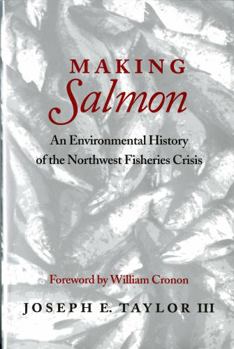Making Salmon: An Environmental History of the Northwest Fisheries Crisis
(Part of the Weyerhaeuser Environmental Books Series)
Select Format
Select Condition 
Book Overview
Winner of the George Perkins Marsh Award, American Society for Environmental History
Format:Paperback
Language:English
ISBN:0295981148
ISBN13:9780295981147
Release Date:March 2001
Publisher:University of Washington Press
Length:488 Pages
Weight:1.44 lbs.
Dimensions:1.0" x 6.0" x 9.1"
Grade Range:Postsecondary and higher
Customer Reviews
4 ratings
Making Salmon Makes Us Human
Published by Thriftbooks.com User , 21 years ago
There's your text books on salmon, and there's required reading.Of the 300-odd salmon titles, Making Salmon is one of those youmust read. Like First Fish, First People, Making Salmon is aboutthe human side of the fishery, its evolution and confabulationas a fought-over resource. Absolutely fascinating history, yourealize right away that nobody has an absolute moral high groundin the salmon debate. Everything is allied against its survival,and yet magically, miraculously, the salmon continue to return.Like Mountain in the Clouds, put Making Salmon on your booklist.
Swimming Against the Current
Published by Thriftbooks.com User , 24 years ago
Making Salmon is the definitive work on the problems facing the salmon fishery of the Pacific Northwest. For as long as man has lived he has exploited the salmon. Joseph Taylor takes the reader on a journey through time as he leads us step by step through the decline of these once great fish. There is plenty of culpability to go around. Foresters, developers, commercial fisherman, native Americans, even sport fishermen all come in for their share of blame. Although focusing on Oregon, Taylor's work is easily transferable anywhere salmon swim, from Alaska to California.Extremely well documented (fully a third of the book is taken up with notes and other addenda) Making Salmon is occasionally dry but never dull. What is most dramatic about this story is the resiliency of the salmon. Time and time again they manage to survive despite our best efforts to save them! Regardless of where you stand on the issue of dams, hatcheries, consumption or conservation, you will find merit in this work. Making Salmon is a must read for anyone interested in the rivers and fisheries of the Northwest.
Swimming Against the Current
Published by Thriftbooks.com User , 24 years ago
As long as man has lived in the Pacific Northwest he has exploited the salmon. In this thorough history of the travails of the pacific salmon, Joseph Taylor does not hesitate to mince words or point the finger of blame, and there is plenty of blame to go around. Native Americans, commercial fishermen, loggers, farmers, sport fishermen, politicians, the states, the feds, the hatcheries, and others, all share the responsibility for the decline of these great fish. Although focusing on Oregon, MAKING SALMON is easily transferable anywhere Pacific salmon exist, from California to Alaska. Extremely well documented, (fully a third of the book is taken up with notes and other addenda) MAKING SALMON takes the reader step by step through the last two centuries of development in the Northwest and what that has meant to the salmon fishery there. Taylor paints an excellent history of failure and simplistic answers to a complex problem. What comes through, as most intriguing, is the resiliency of the salmon. They somehow manage to survive despite our best efforts to save them. Resiliency should not be confused with immortality however. Not always an easy read, MAKING SALMON nonetheless remains essential to anyone wishing to better understand the plight of the Pacific salmon or who is interested in the fine detail of what happens when man and nature collide.
The definitive history of the Northwest salmon crisis
Published by Thriftbooks.com User , 24 years ago
Joseph Taylor's award-winning history of the Northwest salmon crisis is the best book to date on this important topic. No other study is as well researched or beautifully written as MAKING SALMON. Taylor, who teaches environmental and Western United States history at Iowa State University, traces the historical decline of salmon runs throughout the Pacific Northwest, focusing primarily on Oregon. His argument--that while many have claimed to speak for salmon, most have actually articulated their own needs instead--takes the current debate beyond the politics of blame. Understanding the complex social and environmental history of the "salmon crisis," he argues, is essential to thinking more clearly about the future of our region's fisheries. Most impressive is his critique of the role hatcheries have played in diminishing Northwest salmon runs. Science and technology, he concludes, have not always saved nature from human abuses. Abundant illustrations, detailed maps, and a rich bibliography round out the book. There are many titles that explore the decline of salmon in the Pacific Northwest. None address the issue as artfully and intelligently as MAKING SALMON. It is required reading for anyone who cares about the future of Northwest salmon or the people who depend upon them.






